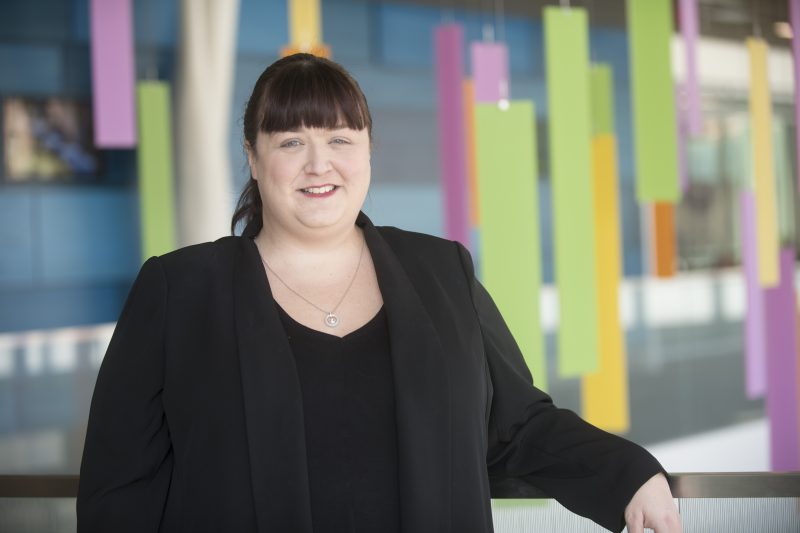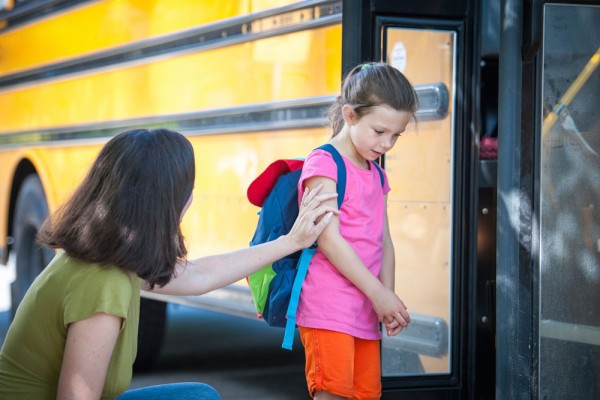You are on a diving board looking below at the deep end of the pool. You are about to deliver a speech. It’s the first day of a new job. Everyone experiences anxiety from time to time. But when does that anxiety cross the line to become an anxiety disorder?
Dr. Laura Markley, who is board certified in Pediatrics, Psychiatry, Child and Adolescent Psychiatry and Addiction Medicine, is a member of the team at Akron Children’s Lois and John Orr Family Behavioral Health Center, recently discussed anxiety disorders in a podcast interview.
Here are the highlights of her talk with Miriam Conner, host of aParently Speaking, which is published by Northeast Ohio Parent. The full interview is available here.

Dr. Laura Markley
The biology of anxiety
“If you look at the biology of it, fear is something that provides a protective function in our brain,” said Dr. Markley. “We should be able to recognize something in our environment – something that could pose danger – with your brain and body responding in way to protect you from being hurt. Evolutionarily, that’s how we have survived, but anxiety is feeling like there is a threat when there is no real threat.”
According to Dr. Markley, there’s normal, developmentally-appropriate anxiety. Think about the toddler who cries when separated from his parent.
There is normal situational anxiety. It’s normal and appropriate to be nervous before an important test, an important meeting, or new experience like a preteen on her first sleepover.
“It becomes an anxiety disorder when it starts to impact your life and your behavior,” said Dr. Markley. For example, when a child begins to pull back from friends and stay home, or when he no longer wants to go to school, that’s time to intervene.
Social Media
Research has been correlating higher levels of depression and anxiety with the use of smartphones and social media in children and teens. It’s something Dr. Markley sees in her daily practice.
“Kids in this society have a constant influx of anxiety-provoking information,” she said. “We all have an unending stream of news that can be somewhat upsetting. Teens are constantly multi-tasking – always looking at a screen or listening to something with their earbuds when they are trying to do one or more other things.”
It’s an interesting dynamic. Young people are drawn to social media because they may be looking for social interaction and reassurances.

“When people are not kind on social media, it can have the opposite effect,” Dr. Markley said. “Social media makes you feel like you are constantly in the spotlight, that people are always looking at your newsfeed and judging you.”
Parents may need to remind teens that for most people, social media is about “putting your best life” forward. So, they shouldn’t try to measure their lives against the “perfectly curated” lives they see on social media.
Anxiety and younger children
Anxiety disorders are not limited to teens. The challenge is that younger children typically lack the skills to verbalize how they are feeling.
“You may have 6-year-old child who is very anxious about going to school but can’t articulate that,” said Dr. Markley. “They can’t say, ‘Hey mom and dad I feel like whenever I go to school, I am being judged.’ Instead, they just say, ‘I feel sick.’”

As the school avoidance persists, parents may assume the child has a “nervous stomach.” They may seek several medical experts, and the child may undergo various tests. With no definitive diagnosis, parents may then assume the child is faking it because they are ill all week but fine on the weekend.
However, this is a classic example of an anxiety disorder, said Dr. Markley. Anxiety can have physical symptoms and those symptoms would lessen on the weekend if the anxiety-provoking triggers are based at school.
The pressure to excel
Dr. Markley fields a lot of questions from parents about school anxiety.
“We have these kids who feel like they really just can’t get straight ‘As’ – they feel like they have to get straight As in all the hardest classes, while also being involved in all the sports and all the clubs,” she said. “Just the thought of that can be overwhelming for some kids.”
In some cases, the pressure comes from the parents, in some cases in comes from the children themselves, and, in some cases, the children assume the parents have higher expectations than they really have.
“Success is nice, but one of the most important things for kids to learn is balance,” Dr. Markley said. “Finding balance is the key to success in life, and it takes some people longer than others to learn this. So, if your child wants to take a bunch of AP [Advanced Placement] classes, insist that they take a study hall. Make sure they have time carved out to do that work.”
How to talk about anxiety
Parents who are trying to gauge their child’s level of anxiety may try to put a personal spin on the conversation. For example, they could say, “Hey, I remember when I was in a bunch of activities, it was stressful. Do you ever feel that way? If life is getting too stressful for you and you need to cut back on something, that’s totally fine.”
They should keep an eye on the child’s academic load and other commitments.
Parents may need to say to their child, “If you are taking hard classes, putting in your best effort and getting a B, that’s fine with us- but if you aren’t giving it your best effort, we need to talk about what we can do to help you be more successful.”
When to seek help
Parents know their children best so they can usually sense when to push children to step into new, uncomfortable situations and when to allow them to pull back. However, keep in mind that the more the more kids step back, stay home and avoid the things at the root of their anxiety, the more the anxiety wins.
“The worst thing is to let your child become a hermit and not go out into the world,” said Dr. Markley.
That said, she is often approached by parents considering home schooling. Many factors play into this decision and there are good reasons to home school. But if the decision to home school is based on the child’s increasing school anxiety, the transition to home schooling should coincide with a planned re-entry.
“Parents often don’t know the ways they can get schools to work with them,” she said. “You don’t have wait months for a [school-based] evaluation. If you have a note from a physician or therapist, you can ask for a 504 Plan – that may be a way to request extra time for assignments, or other accommodations. It doesn’t require all the IQ testing and months that it takes to get an Individualized Education Plan (IEP), and it can be revisited each year.”
Modeling behavior
Anxiety is often hereditary, but if addressed early, sometimes its progression to a disorder can be avoided. Parents play an important role as their children’s first and most influential models of behavior.
Children watch their parents’ reactions to upsetting news stories on TV, unpleasant encounters with family, friends and strangers, work-related stress, and other situations.
“Kids regulate their internal environment based on their external environment,” said Dr. Markley.
“If you overreact or get emotional to every unpleasant thing you see and hear, they [the children watching] may respond accordingly.”
Parents should strive to express concern and empathy when faced with upsetting news, and, of course, answer their children’s questions with appropriate language and assurance.
If you have concerns about your child’s mental health, talk with their provider.
“Many children can thrive when therapy is started early for anxiety symptoms,” said Dr. Markley, “and that their primary care physician is a great initial resource in addressing signs and symptoms of anxiety.”










